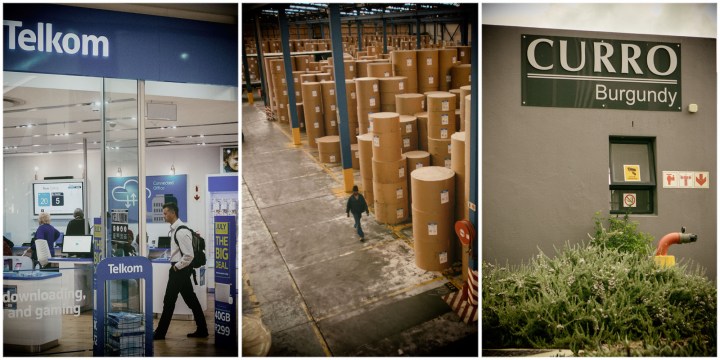PHANTOM SHARES
The Finance Ghost: Mixed fortunes at Sappi, Curro, Aspen, Telkom and Ellies

It's a bag of all sorts from the paper and packaging sector. Elsewhere, Telkom fails to dial up its numbers; Curro delivers a good lesson plan; Aspen rises on the back of its Viagra deal; and lights grow dimmer – thanks, Eskom – at Ellies.
The paper and packaging sector was busy this week, with results from Sappi, Mondi and Mpact.
There are no similarities in the numbers, though, with Sappi’s headline earnings per share (Heps) getting murdered by an 80% drop and Mpact releasing a spectacularly good set of numbers in this environment (Heps up 33%).
Mondi suffered a drop in Heps of 28%, which only looks all right next to the Sappi number. Mondi’s dividend was increased by 7.7% based on improved cash from operations despite the drop in profits.
Mpact’s early-adopter approach to solar is part of why it did so well. Combined with load curtailment agreements with Eskom, the company is almost immune to blackouts up to Stage 6.
Curro’s lesson in momentum
Despite facing numerous challenges in SA, Curro managed to deliver strong financial results during a difficult period.
Given the nature of its wealthy consumer base, Curro has been affected by middle-class emigration and a general lack of spending power (not to mention the rise in interest rates and the subsequent effect on bond repayments for the average household). Despite these headwinds, Curro’s performance for the six months ended June has been remarkably positive.
The key metric is recurring Heps, as this excludes a long-overdue education subsidy received by Meridian in the previous year. This metric is up by between 26.5% and 45.5%. South Africans will sacrifice almost anything to keep their kids in private schools, which probably says more about the quality of government school education than it does about Curro.
Aspen on the rise
Puns were irresistible when the news broke of Aspen’s acquisition of the rights to Viagra and other products in Latin America.
The portfolio being acquired from Viatris has been valued by Aspen at $280-million, yet the price is $150-million cash plus a seven-year supply agreement with Viatris. The terms of this agreement have not been explicitly stated, which suggests that it must be favourable to Viatris, given the gap between the cash price and the value of the portfolio.
A valuation is always an educated guess. Owing to the complex structure of Viatris, the company cannot accurately determine the profits derived from this portfolio. The only thing Aspen knows is that the portfolio of drugs achieved annual sales of $92-million.
The assumption is that the gross margin will exceed the 60% gross margin in its commercial pharmaceutical segment.
No one answers at Telkom
Telkom is facing significant challenges as its legacy business continues to decline rapidly while new revenue initiatives struggle to compensate for the loss. Despite revenue growth of 3.8% and labour restructuring initiatives to try to cut costs, the company’s group Ebitda fell by 4.2% in the quarter ending June.
The positive aspects of Telkom’s performance include a 5.2% rise in mobile revenue and a 10.6% growth in “new generation” revenue at Openserve. There was a 24.2% drop in legacy voice services revenue in Telkom Consumer.
Openserve faced challenges with a 29% decline in fixed voice revenue. In the BCX segment, the legacy Converged Communications business experienced a revenue drop of 12.8%.
With problematic pockets across the group, the good stuff tends to get outweighed by the bad stuff. For example, BCX’s Ebitda fell by a nasty 38.2% and the Ebitda margin was just 7.9%. Even Swiftnet, which operates in the towers business, faced challenges owing to terminations by a mobile network operator customer.
Lights are out at Ellies
Days are dark at the electrical components business and the numbers show just how bad things are. Revenue for the year ended April fell by 7.7% and operating losses reached R46.9-million. This was affected by the company’s restructuring efforts, with a cost of R18-million and an expectation of R30-million in annual savings.
With interest expenses of R21.3-million, the attributable loss after tax soared to R85.4-million, nearly doubling the previous year’s loss. The balance sheet simply isn’t sustainable.
The headline loss per share of 10.78 cents has taken the tangible net asset value per share to just 6c. With a market cap of below R50-million and a plan to raise R120-million in fresh capital at 7c per share for the Bundu Power acquisition, Ellies shareholders will be heavily diluted to help the company to stay alive.
Without Bundu Power and the push into renewables, I think the show is probably over for Ellies. DM
After years in investment banking by The Finance Ghost, his mother’s dire predictions came true: he became a ghost.
This story first appeared in our weekly Daily Maverick 168 newspaper, which is available countrywide for R29.


















 Become an Insider
Become an Insider
Comments - Please login in order to comment.